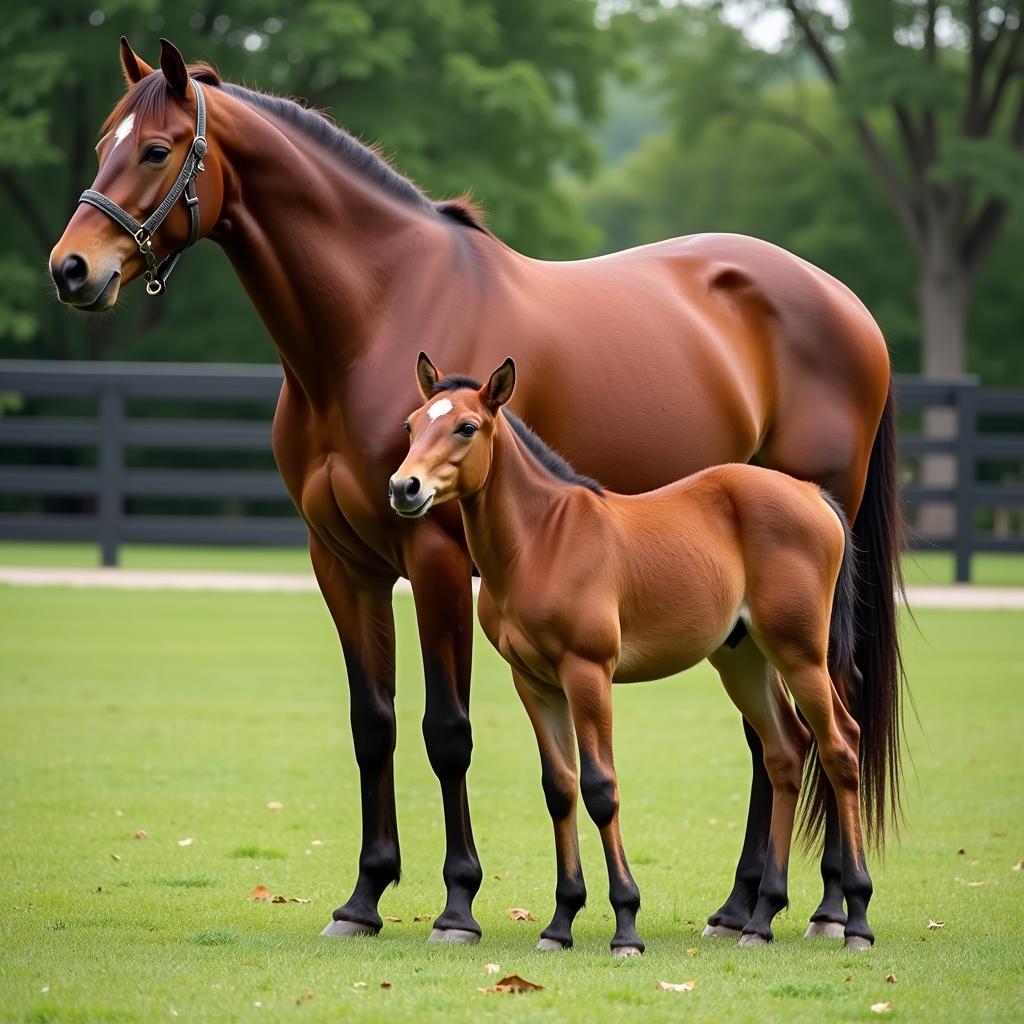Quarter Horse Broodmares are the backbone of countless ranches and breeding programs across the nation. These exceptional mares possess the bloodlines, conformation, and temperament to produce outstanding foals for various disciplines. But choosing the right Quarter Horse broodmare for your breeding program is a significant decision that requires careful consideration and research.
Defining Your Breeding Goals
Before diving into the specifics of selecting a mare, it’s crucial to establish your breeding goals. Ask yourself:
- What disciplines are you targeting? Different bloodlines excel in various areas like reining, cutting, barrel racing, or ranch work.
- What conformation standards are essential for your program? Define the physical traits that align with your chosen discipline.
- What temperament do you desire in your foals? A mare’s disposition significantly influences her offspring’s temperament.
Once you have a clear vision of your ideal foal, you can narrow your search for a mare with the genetic potential to produce those qualities.
Evaluating Bloodlines and Pedigree
A Quarter Horse broodmare’s pedigree is a window into her genetic potential. Studying her lineage—both on the sire and dam’s side—can reveal valuable information about:
- Performance history: Look for ancestors with proven track records in your chosen discipline.
- Conformation strengths and weaknesses: Pedigree analysis can identify recurring patterns in conformation, highlighting potential strengths and weaknesses the mare might pass on.
- Heritability of Temperament: While not always guaranteed, certain bloodlines are known for producing horses with desirable temperaments for specific disciplines.
Assessing Conformation and Soundness
A broodmare’s physical structure directly impacts her ability to carry a foal to term and her longevity as a breeding animal. Pay close attention to her:
- Overall balance and structural correctness: Look for a mare with good proportions and correct skeletal structure, ensuring she moves soundly and efficiently.
- Reproductive soundness: A thorough veterinary examination is crucial to assess her reproductive health and identify any potential issues.
- Legs and feet: Strong, correctly conformed legs and healthy hooves are essential for a broodmare, as she’ll be carrying extra weight during pregnancy.
The Importance of Temperament
A mare’s temperament is a crucial factor often overlooked. A calm, tractable, and easy-to-handle mare will make your life as a breeder much easier. Moreover, she’s more likely to produce foals that share those same desirable traits.
Observe the mare’s demeanor and how she interacts with people and other horses. Look for signs of:
- Intelligence and Trainability: A smart, willing mare will be easier to manage during breeding, pregnancy, and foaling.
- Gentleness and Patience: These qualities are particularly valuable for mares that will be handled by children or novice horse owners.
 Gentle Quarter Horse Broodmare and Foal
Gentle Quarter Horse Broodmare and Foal
Conclusion: Investing in Quality
Choosing the right Quarter Horse broodmare is an investment in the future of your breeding program. By carefully evaluating bloodlines, conformation, and temperament, you can find a mare who will become a valuable asset, producing exceptional foals for years to come. Remember, knowledge is key—seek guidance from experienced breeders and veterinarians to make informed decisions and ensure the success of your breeding endeavors.
FAQs:
- Q: How much does a Quarter Horse broodmare cost?
- A: Prices vary widely based on pedigree, age, performance history, and location.
- Q: What is the ideal age for a Quarter Horse broodmare?
- A: Mares typically reach their breeding prime between 4 and 12 years old, but they can produce foals well into their late teens or even twenties with proper care.
Need help finding your perfect Quarter Horse broodmare? Contact us at Phone Number: 0772127271, Email: [email protected], or visit us at QGM2+WX2, Vị Trung, Vị Thuỷ, Hậu Giang, Vietnam. Our team of experts is available 24/7 to assist you.